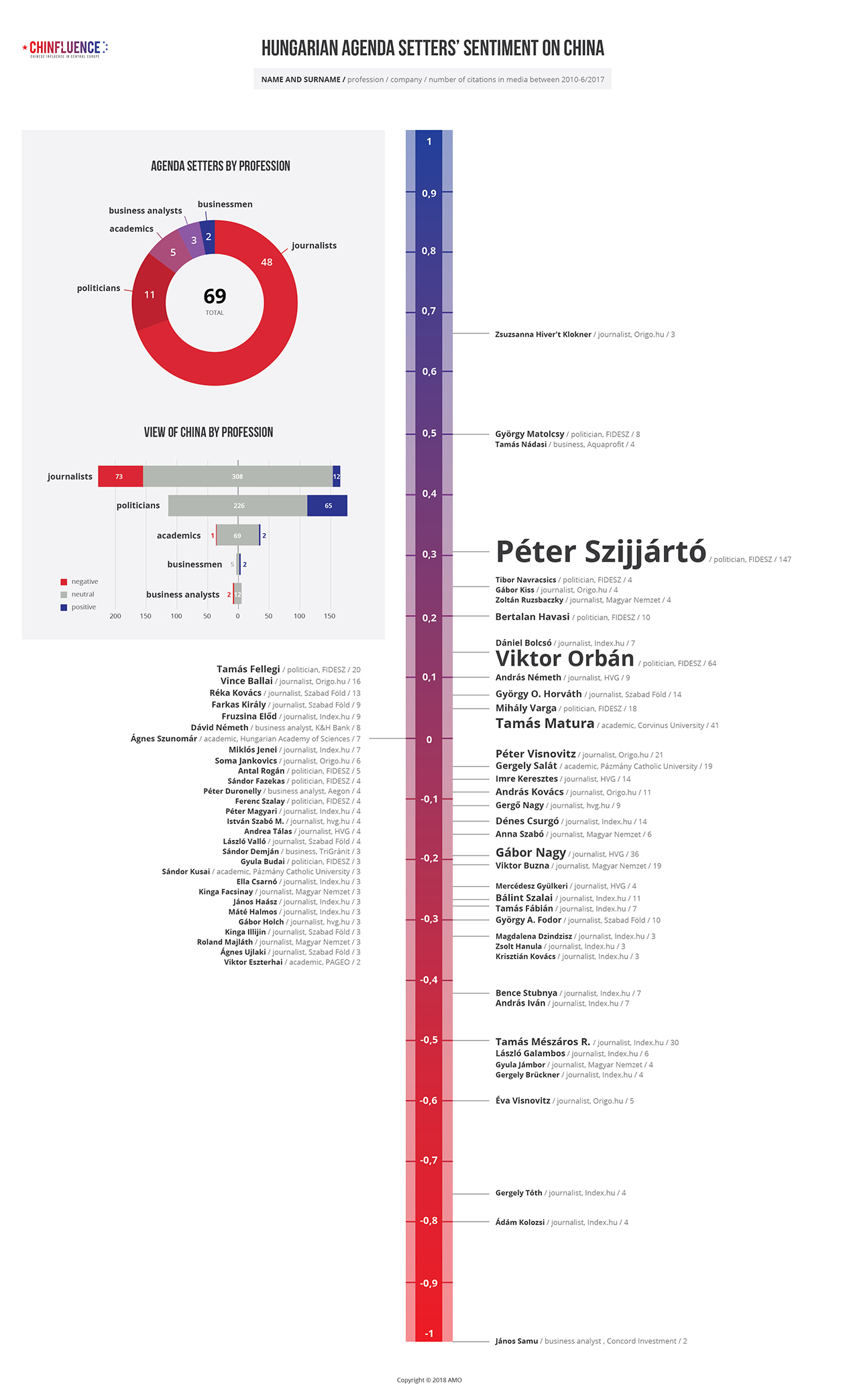Hungarian Social Network Analysis

The second objective of the project was to identify and explain the web of opinion of agenda setters involved in the recent pro-China turn. At this stage, researchers looked at agenda setters of the discourse – authors and co-authors of articles, sources, quoted persons, companies and institutions – and identified those who took part in the discourse directly, and those who were mentioned by others but did not contribute to the discourse themselves. Looking back to the dataset, researchers then coded agenda setters’ direct speech acts regarding China as either -1 (negative to China), 0 (neutral to China) or +1 (positive to China). The agenda setter’s sentiment value counted as an average of the sentiment in relation to the number of citations by the agenda setter in the analyzed dataset represents a position of each actor on China and vis-a-vis others on the scale.
The list of Hungarian agenda setters is surprisingly short compared to the Czech Republic or Slovakia . There are less then seventy people who have been cited at least three times in the analysed period by major media sources, and only fourteen of them have been asked for a comment at least twice a year. Almost 4,000 articles featured 764 citations, that is less than 20 percent of the publications asked for comment from agenda setters (or even less, as one article might have citations from more than one person). Thus, the public sentiment is mostly influenced by a handful of agenda setters, most of whom are politicians or journalists, but not China experts. When it comes to the role of politicians there are only eleven politicians among agenda setters, while some of them tend to be the most frequently quoted ones, representing 38 percent of all citations.
The foreign minister Péter Szijjártó and the prime minister Viktor Orbán occupy the top two positions with by far the highest numbers of citations, followed by two other governmental officials occupying the 7th and 10th positions. György Matolcsy, the president of the Hungarian National Bank, is also one of the agenda setters. Nevertheless, Antall Rogán, minister of the Prime Minister’s Cabinet Office, has been quoted a mere five times only on China in the analyzed period, despite the fact that he played a fundamental role in establishing the Hungarian residency bond program, which was mostly utilized by Chinese residents.
One of the most striking results is the total lack of comments made by opposition side politicians among the sixty-nine agenda setters. Comments have only been made by members of the governing Fidesz party. Consequently, the group of politicians from Fidesz proved to nurture the most favorable feelings towards China, as 22 percent of their comments were positive, while none of their citations expressed negative opinions. This is in line with the above-mentioned hypothesis that China is not a major concern to the political parties or the public in Hungary, and that the majority of the population and politicians agree with the development of bilateral relations, which may contribute to the lack of proper discourse in the country on China.
Another significant finding is the high prevalence of journalists. Two thirds of the agenda setters are journalists, representing 51 percent of all ‘citations’ and four of them even made it in the top ten of the list. Journalists are also the most critical group towards China, as almost 19 percent of their publications were negative, and only 3 percent positive. It is also noteworthy that news sources close to the government (the national television and radio, origo.hu, TV2) and their authors tend to be generally less critical towards China than other sources (HVG, hvg.hu, RTL Klub, index.hu).
On the contrary, China experts are surprisingly underrepresented on the list. Only four of them are on the list out of almost seventy agenda setters, and they represent a mere 9 percent of all citations, while their attitudes are generally balanced towards China. One of the biggest surprises was the irrelevance of businesspeople and business analysts. The two groups combined represent3 percent of all publications, which is in stark contrast with the extremely high number of publications focusing on the economy of China.
The researchers requested some of the agenda setters to fill an online questionnaire about China. Though the results are not representative, they were still very interesting. The overwhelming majority of respondents agreed that China is an important partner to Hungary, and that the two countries nurture a good relationship. The same share of respondents thinks, however, that neither the interests nor the values of China and Hungary are the same. The majority of agenda setters cannot see the impact of excellent bilateral political relations on the economic cooperation between the two countries, though they agree that it would be desirable to attract more Chinese investment into Hungary, and to participate in BRI related activities.
The more detailed analysis of agenda setters can be found at the policy paper A kínai jelenlét Magyarországon (in Hungarian).


